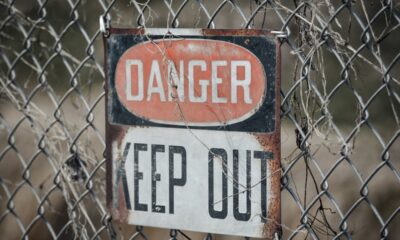Latest News
January 1, Navy Faces Critical Shortage of Merchant Marines, Threatening National Security

The U.S. Navy is facing a severe shortage of Merchant Marines, forcing officials to consider taking 17 vessels out of regular operation. The Merchant Marine workforce, comprised of civilian mariners managed jointly by the federal government and the private sector, has been hollowed out to the point that it can no longer adequately crew ships across the fleet.
According to Rear Admiral (Ret.) Mark Montgomery, senior director at the Center on Cyber and Technology Innovation for the Foundation for Defense of Democracies, “The problem, of course, is the ships are at sea, away from home port 12 months of the year.”
Though Merchant Marines are not officially part of the U.S. military, they play a critical role by operating commercial ships and serving as an auxiliary force during wartime or national emergencies, as noted by the Department of Transportation’s Maritime Administration.
Montgomery emphasized the dire situation: “We’re desperately short of the number of people,” he said. “There’s a lack of experienced merchant mariners to crew the ships, and this is really a clear danger to national security.”
In response to this crisis, the Navy’s Military Sealift Command (MSC) announced plans to place 17 ships into “extended maintenance,” according to the U.S. Naval Institute. These ships include “two Lewis and Clark replenishment ships, one fleet oiler, a dozen Spearhead-class Expeditionary Fast Transports (EPF), and two forward-deployed Navy expeditionary sea bases.” The crews of these vessels will be redistributed to other ships to ensure they remain operational.
Montgomery further clarified that this issue predominantly impacts Merchant Marines rather than military sailors. “The sailors tend to man our warships… the merchant mariners man something that’s equally important, which is the logistics backbone of the Navy — oilers, ammo ships, transport ships that move the Army and Marine Corps across the water,” Montgomery noted.
He also pointed out the importance of maritime logistics: “Just like 90 percent of trade is done by ships and not aircraft, the same thing applies at sea: It’s too difficult, too expensive — it’s not sufficient to move all that stuff by aircraft, so it’s moved by ships.”
This alarming shortage highlights the vulnerability of our nation’s maritime capabilities and underscores the urgency for a robust solution to fortify this essential component of our national security infrastructure.
As our loyal readers, we encourage you to share your thoughts and opinions on this issue. Let your voice be heard and join the discussion below.

-

 Entertainment2 years ago
Entertainment2 years agoWhoopi Goldberg’s “Wildly Inappropriate” Commentary Forces “The View” into Unscheduled Commercial Break
-

 Entertainment1 year ago
Entertainment1 year ago‘He’s A Pr*ck And F*cking Hates Republicans’: Megyn Kelly Goes Off on Don Lemon
-

 Featured2 years ago
Featured2 years agoUS Advises Citizens to Leave This Country ASAP
-

 Featured2 years ago
Featured2 years agoBenghazi Hero: Hillary Clinton is “One of the Most Disgusting Humans on Earth”
-

 Entertainment1 year ago
Entertainment1 year agoComedy Mourns Legend Richard Lewis: A Heartfelt Farewell
-

 Featured2 years ago
Featured2 years agoFox News Calls Security on Donald Trump Jr. at GOP Debate [Video]
-

 Latest News1 year ago
Latest News1 year agoNude Woman Wields Spiked Club in Daylight Venice Beach Brawl
-

 Latest News1 year ago
Latest News1 year agoSupreme Court Gift: Trump’s Trial Delayed, Election Interference Allegations Linger
DORIS
September 4, 2024 at 7:27 pm
Let Congress Members go especially the Democrat Party. They don’t do on thing to accommodate our men and women serving. I wouldn’t agree to go myself.
Peter A Rose
September 4, 2024 at 7:46 pm
Maybe the federal government should subsidize the tuition at the California Maritime Academy.
David F. Lanphere
September 13, 2024 at 7:06 pm
Don’t even let me get started on this. I am retired from the Military Sealift Command, so I have a few ideas on what went wrong. If I tell you everything, I am afraid I will get a visit from someoneof us were required to take an experimental in the middle of the night. In my opinion, this problem goes all the way back to the early 90’s when a certain group of people in Washington decided that they should consolidate the various units of MSC into one, and to move the main office to Washington DC of all places.A certain president was upset that the Coast Guard Document we all have to carry, was good for life. No more continuing revenue stream? Of course, the US Coast Guard considered working with us was a pain in the butt and pretty much beneath them. The training that was provided to us by MSC was not enough, so all that all of us were required to take a known poison injection just to satisfy a bunch of criminals back in Washington DC. And then because of Manning Problems, once we were on a ship, we couldn’t leave, and not only that, because there were no Civilian Mariners on the Beach to replace us after the 4 month contract. And even when the ship was Pierside, the gangway was secured for the Civmars, but not for the US Navy Sailors or the Maintenance Contractors. We couldn’t even go to the Exchange! Kind of like living on a prison ship with pay. And then Washington can’t understand why the Civmars were and are unhappy with their working conditions. This kind of life is not one that many children want to enter into, since much of the year, we were out of range of any kind of INTERNET ACCESS. An example is Diego Garcia, where the download speed was as much as 1Mb on a good day. And try to understand that the ship would have internet access for OFFICIAL BUSINESS ONLY, so personal internet was something we did when on the Beach, not on the official computer gear on the ship. Sometimes people have families that like to correspond with their loved ones. And, unlike the vast majority of the Civilian workforce, we don’t go home on the weekend like from thursday to tuesday. We work or are available 24/7 from the time we report aboard until we leave.